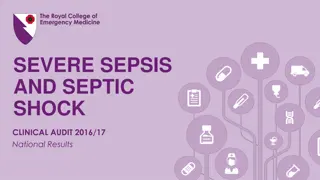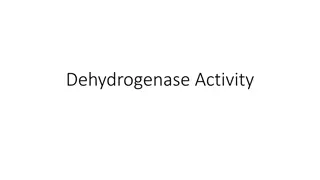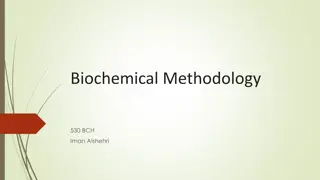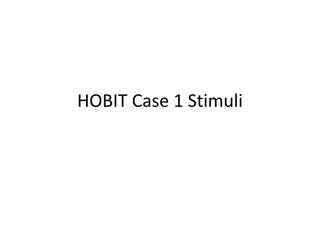Electrolyte and Metabolic Disturbances in the Critically Ill
Dr. Srilekha Ammapalli discusses the cations (sodium, potassium, calcium, magnesium) and anions (chloride, bicarbonate, phosphate, lactate) involved in electrolyte and metabolic disturbances in critically ill patients. The physiology, causes of abnormalities, diagnosis, evaluation, and management of
2 views • 104 slides
Understanding Shock: Causes, Symptoms, and Stages
Shock is a critical condition caused by an imbalance between cellular oxygen supply and demand, leading to organ dysfunction. Compensatory responses include increased heart rate, vasoconstriction, and hormonal adjustments. Recognizable features of shock include tachycardia, hypotension, cool clammy
3 views • 27 slides
Investigating Dehydrogenase Activity Using Yeast
This investigation focuses on exploring respiration in yeast by tracking the breakdown of glucose using dehydrogenase enzymes. The experiment involves immobilizing yeast into gel balls and measuring the change in color of resazurin dye to quantify the rate of respiration. Safety measures, risk asses
2 views • 11 slides
National Audit Results for Severe Sepsis and Septic Shock 2016/17
This presentation outlines the national results of a clinical audit conducted in 2016/17 regarding the management of severe sepsis and septic shock in Emergency Departments (EDs). The audit objectives include benchmarking current performance, facilitating national and peer comparisons, identifying a
0 views • 25 slides
Understanding Dehydrogenase Enzymes and Their Activities
Dehydrogenases are intracellular respiratory enzymes that play a crucial role in oxidation-reduction reactions by transferring hydrogen atoms. This article explores the functions and properties of dehydrogenase enzymes, including the procedure to demonstrate their activity in a plant sample. Lactate
0 views • 9 slides
Understanding Carbohydrate Metabolism and Diabetes Mellitus
Carbohydrates play a vital role in energy production through processes like glycolysis and gluconeogenesis. Glucose metabolism involves pathways like aerobic glycolysis and anaerobic lactate production. In diabetes mellitus, there is a disruption in carbohydrate metabolism leading to elevated blood
1 views • 14 slides
Protein Isolation Techniques: Salting In and Salting Out
Proteins exhibit varying solubility based on salt concentrations, with salting in increasing solubility and salting out causing precipitation. This practical involves isolating lactate dehydrogenase enzyme using salting in, salting out, and dialysis techniques, as well as assessing purity through ac
0 views • 19 slides
Newborn Screening 2014: Overview of Conditions and Management
The Pediatric Continuity Clinic Curriculum for Newborn Screening 2014 aims to increase familiarity with disorders tested in Florida Newborn Screening and manage abnormal results effectively. The presentation covers the goal of NBS, common diagnoses, resources for managing abnormal screens, and speci
0 views • 34 slides
DIY: Make Edible Water Bottles to Reduce Plastic Waste
Learn how to create edible water bottles using sodium alginate and calcium lactate, helping to reduce plastic waste from traditional water bottles. Discover the environmental impact of plastic bottles and why sustainable alternatives are crucial. Take a step towards a greener future by following the
0 views • 5 slides
Understanding G6PD Deficiency Hemolytic Anemia: Biochemical Basis and Implications
G6PD deficiency hemolytic anemia is an inherited condition characterized by reduced levels of glucose-6-phosphate dehydrogenase (G6PD), leading to impaired production of NADPH. This deficiency affects the Pentose Phosphate Pathway (PPP) and can result in oxidative stress, causing damage to DNA, prot
0 views • 18 slides
Biochemical Methodology 530 - Lactate Dehydrogenase Extraction and Purification Experiment
This course focuses on the extraction and purification of lactate dehydrogenase (LDH) using a series of procedures involving tissue preparation, centrifugation, and ammonium sulfate precipitation. The methodology includes detailed steps from preparing the extraction buffer to isolating LDH in differ
0 views • 10 slides
Diagnostic Workup Results for Patient X
The diagnostic workup for Patient X includes various imaging studies such as ECG, CXR, Head CT scan, CT Abdomen/Pelvis, and Repeat CXR. Laboratory results show abnormal CBC values, BMP findings, LFTs, and lactate levels with associated VBG results. Further evaluation is needed based on these results
0 views • 11 slides

